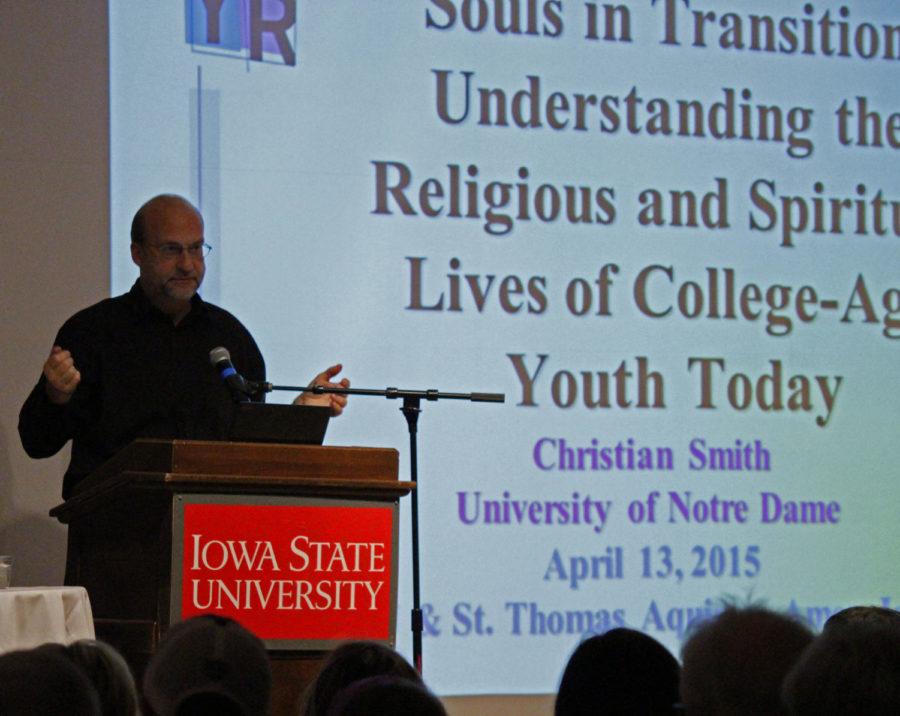Lecture discusses trends in young adults’ spiritual lives
Christian Smith, author, professor of sociology, and director of the Center for the Study of Religion and Society at Notre Dame University, gave a lecture in the Sun Room of the Memorial Union on Monday about religion for college-age Americans. He talked about the transitions into or out of religion during college years and different religious beliefs and practices.
April 13, 2015
Students ventured out to hear about the patterns of their generation’s spirituality and religious devotion on April 13 at the Memorial Union.
Christian Smith, professor of sociology at the University of Notre Dame, spoke on the findings of his 16-year-old research project, which examined the changing patterns that emerging adults, ages 19 to 23, experience in their spiritual lives.
“It’s a time of freedom and exploring opportunities,” Smith said, speaking on the characteristics of the age group he studied. “It’s also a time of fear and anxiety.”
For his research, Smith surveyed 3,370 parent and teen pairs throughout the 16 years. During these two- to four-hour discussions, Smith and his team would ask the young adults questions related to their spiritual beliefs and outlooks on life.
“This generation of emerging adulthood is a script, and the script says two things: one, you’re having fun, and two, you’re building future materials for success,” Smith said.
From this research, Smith said he discovered a multitude of patterns and characteristics that separate this generation from all others.
“Things have changed in the last decades. My dad ran away from home when he was 16. He got married when he was 19,” Smith said. “Young people are waiting longer and longer to get married and they’re waiting longer and longer to have babies.”
This, Smith said, along with birth control pills, cultural saturation of entertainment, postmodern-relativism and several other factors have created a generation that is actively given more time to explore their personal beliefs and ideals.
“You are one of the first generations to have so many options to explore,” Smith said.
However, this sort of mentality and lifestyle has led to an avoidance of exploring beliefs, and an overall fear of challenging others’ beliefs, Smith said.
“Trying to talk to an emerging adult about faith is like talking to a 14 year old about life insurance,” Smith said.
According to Smith’s study, this avoidance of examining one’s faith during these emerging adult years leads to a mentality of waiting to think about one’s beliefs until he or she reaches an older age. However, most young people surveyed said they looked at religion favorably, seeing it as a basis for learning morality.
“Emerging adults would consider religious congregates like elementary schools of morals,” Smith said.
This mentality toward religious institutions could explain the declining attendance of many religious institutions over the past years, Smith said.
“There’s really no rationale for an 18 year old to go to church,” Smith said. “Once you pass fifth grade, you don’t go back to elementary school.”
Many students said they agreed with Smith’s evaluation of their generation, saying that some of the generalizations he made described them perfectly.
“He said a lot of things that I completely agreed and felt at one time, especially with that mentality of having fun,” said Sara Brinkman, junior in agricultural biochemistry.
The Rev. Jon Seda of St. Thomas Aquinas Catholic Church said he feels this sort of mentality has been prevalent for the long duration that he was a priest.
“I have seen people in their 40s and 50s with that same mentality,” Seda said. “I have spoken at funerals for people with sports team logos instead of crosses on their tombstones.”
In the end, Smith said, these young adults will have their own children and take them to church the same way they take them to elementary school, diligently attending every appointment but trailing off when the lesson is learned.







